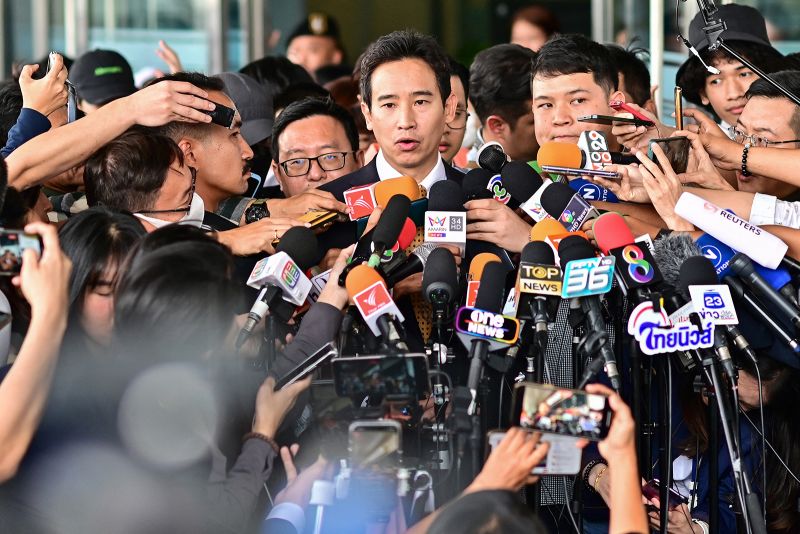
The Impact of Thai Court Ruling on Move Forward Party

Exploring the consequences of the Thai court's ruling against the Move Forward Party and its implications for the country's political landscape.
The Constitutional Court's Verdict
In a significant and contentious ruling, the Constitutional Court in Bangkok delivered a verdict that has sent shockwaves through Thailand's political landscape. The court ordered the country's most popular political party, Move Forward, to cease its efforts to amend the deeply entrenched royal defamation law, dealing a severe blow to the hopes of its supporters for reforming the powerful monarchy.
A pro-democracy protester is surrounded by police at a demonstration in Bangkok on November 17, 2022.
The court's decision, which deemed Move Forward's campaign to amend the lese majeste law unconstitutional, has sparked widespread debate and raised concerns about the limitations it imposes on parliamentary actions and freedom of expression. This ruling has far-reaching implications for the country's political future and the aspirations of millions of young citizens for transformative change.
Thai King Maha Vajiralongkorn presides over the annual royal ploughing ceremony at the Sanam Luang park in Bangkok on May 9, 2019.
The Move Forward Party, which gained the highest number of seats in the previous election, found itself at the center of controversy as the court accused its leaders, including former prime ministerial hopeful Pita Limjaroenrat, of attempting to undermine the constitutional monarchy through their advocacy for amendments to the royal defamation legislation. The court's ruling has cast a shadow over the party's future, potentially paving the way for further legal actions that could lead to its dissolution and the prosecution of its leaders.
Former Thai prime ministerial candidate and ex-Move Forward Party leader Pita Limjaroenrat (C) speaks to the media outside the Constitutional Court in Bangkok on January 24, 2024, after the court decided to reinstate him as a lawmaker.
The Ramifications for the Reform Movement
The court's verdict has dealt a significant blow to Thailand's reform movement, particularly impacting the aspirations of the country's young population for progressive change. The ruling has raised concerns about the potential curtailment of political activism and the limitations it imposes on advocating for amendments to the lese majeste law, also known as Section 112.
Moreover, analysts have pointed out that the ruling sets a precedent that effectively renders the lese majeste law untouchable within the existing constitutional framework, limiting any legal avenues for its reform. This has sparked discussions about the broader implications for Thailand's constitutional order and the balance of power between the judiciary and the parliament.
The Move Forward Party's spokesperson, Parit Wacharasindhu, highlighted the far-reaching implications of the ruling, expressing concerns about potential restrictions on the actions of parliamentarians and political actors in the future. These concerns underscore the profound impact of the court's decision on the dynamics of political engagement and advocacy for legal reforms in Thailand.
Challenges and Future Prospects
The court's ruling has ignited debates about the challenges facing progressive political forces in Thailand and the obstacles they encounter in pursuing their reform agenda. Move Forward lawmaker Wiroj Lakkhanaadisorn emphasized the party's determination to continue the reform movement, regardless of the legal challenges it faces.
The longstanding struggle against the country's strict lese majeste laws and the limitations they impose on freedom of expression has garnered international attention, with human rights organizations and free speech advocates condemning the legal framework as a tool for political repression.
The ruling has reignited public discourse on the role of the monarchy in Thailand's constitutional order and has raised questions about the prospects for meaningful reform within the existing political system. It has also underscored the growing tensions between the demands for reform and the entrenched power structures that continue to shape the country's political landscape.











